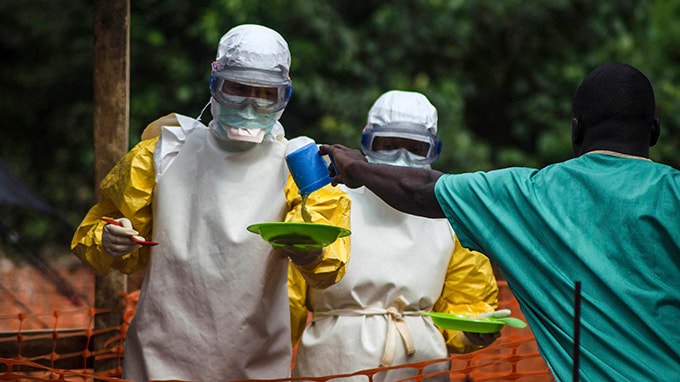Vietnam prevents Ebola: Closely monitors immigrants
To prevent the epidemic from spreading into Vietnam, the Ministry of Health requested that the Health Departments of provinces and cities coordinate with authorities at border gates to closely monitor entrants, especially those coming from countries with epidemics.
In an urgent dispatch recently sent to the Chairmen of the People's Committees of provinces and cities, the Ministry of Health said that the Ebola virus causes a dangerous acute infectious disease that can spread rapidly and has a high mortality rate (90% of cases) in some West African countries.
To prevent the epidemic from spreading into Vietnam, the Ministry of Health requested that the Health Departments of provinces and cities coordinate with authorities at border gates to closely monitor entrants, especially those coming from countries with epidemics.
 |
| Doctors Without Borders team brings food to quarantined patients in a treatment area in Sierra Leone - (Photo: Reuters) |
At the same time, it is necessary to carry out good surveillance in the community and medical facilities. When detecting a suspected case of Ebola virus disease with a history of travel from an epidemic area within 21 days, relevant agencies must immediately implement isolation measures and take samples for testing.
The Ministry of Health said the Ebola virus caused the world's first epidemic in Sudan in 1976, infecting more than 600 people. Since then, the epidemic has occurred in 11 African countries.
In particular, from December 2013 to July 30, 2014, the world recorded 1,323 infected people, including 729 deaths in 4 West African countries (Guinea, Liberia, Sierra Leone and Nigeria). In 8 days alone (from July 24 to 31, 2014), there were 122 infected people, including 57 deaths.
Up to now, the epidemic has shown no signs of abating in the above countries and there is a high risk of spreading to other countries.
The disease is transmitted from person to person through direct contact with blood, secretions, body parts of infected people, infected animals or contact with environments contaminated with secretions of infected people or animals.
People infected with Ebola virus disease often have the following symptoms: sudden fever, prolonged fatigue, muscle pain, headache, sore throat. This is followed by symptoms of vomiting, diarrhea, rash, kidney failure, liver failure. Some cases have internal and external bleeding.
The incubation period is 2 to 21 days. Patients are contagious as soon as they start showing symptoms.
Recommendations of the Ministry of Health:
There is currently no vaccine to prevent the disease. To prevent the disease, the Ministry of Health recommends that people:
- Practice personal hygiene (wash hands with soap, disinfectants, etc.)
- Avoid direct contact with blood and secretions of infected people and animals.
- Do not handle/grasp objects that may have come into contact with blood or secretions of infected people or animals.
- If you are in an epidemic area and experience symptoms (fever, headache, sore throat, diarrhea, vomiting, stomach pain, rash, red eyes), go to a medical facility immediately for timely treatment.
According to Vietnamnet






